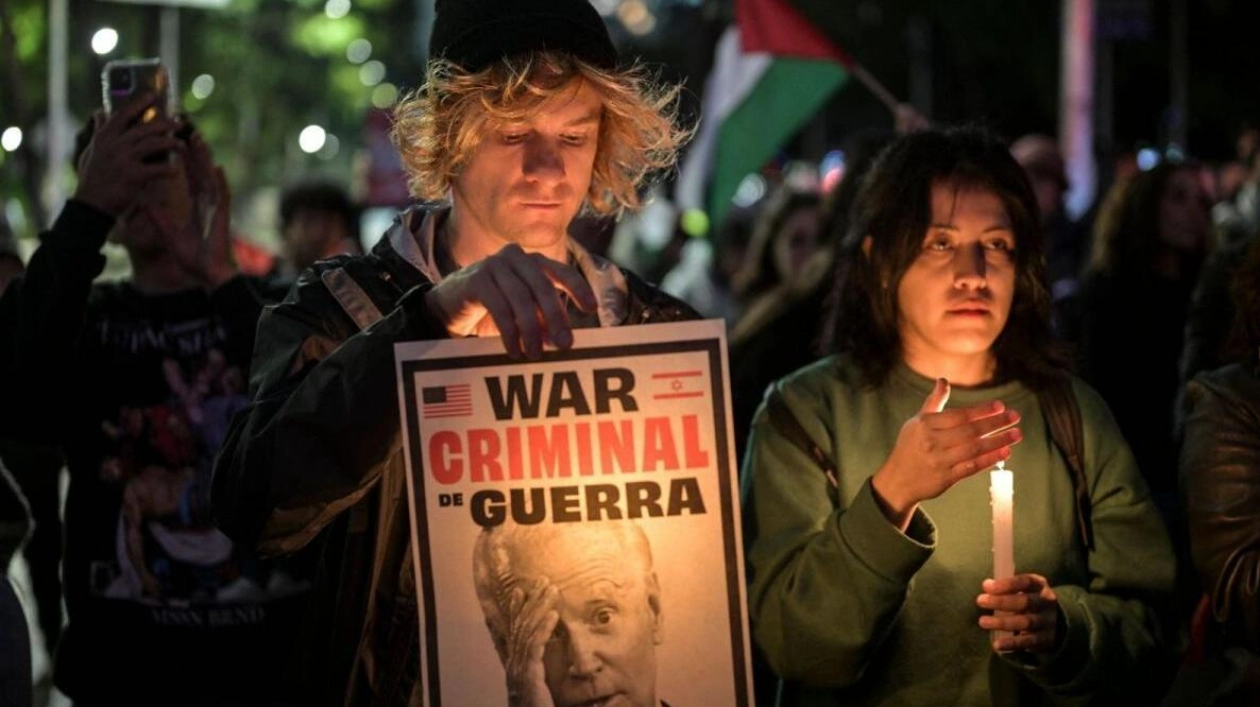A pro-Palestine activist holds a sign featuring a portrait of US President Joe Biden, which reads 'War criminal' in Spanish, during a vigil in Mexico City on October 7, 2024. — AFP
After weeks of intense diplomacy aimed at securing a ceasefire between Israel and Hezbollah militants, the United States has opted for a different strategy: allowing the conflict in Lebanon to continue. Just two weeks ago, the US and France were calling for an immediate 21-day ceasefire to prevent an Israeli invasion of Lebanon. However, this effort was thwarted by Israel's assassination of Hezbollah leader Syed Hassan Nasrallah, the October 1 launch of an Israeli invasion into southern Lebanon, and subsequent airstrikes that decimated much of Hezbollah's leadership.
Now, US officials have abandoned their calls for a ceasefire, arguing that circumstances have evolved. 'We do support Israel launching these incursions to degrade Hezbollah's infrastructure so ultimately we can achieve a diplomatic resolution,' stated State Department spokesperson Matthew Miller during a recent press briefing. This shift reflects conflicting US objectives—containing the escalating Middle East conflict while also significantly weakening Iran-backed Hezbollah.
The new approach is both pragmatic and risky. The US and Israel would gain from the defeat of a common enemy—Hezbollah, which Tehran uses to threaten Israel's northern border—but encouraging Israel's expanding military campaign risks an uncontrollable conflict. Jon Alterman, a former State Department official, noted that while the US wants to see Hezbollah weakened, it must balance this against the risk of 'creating a vacuum' in Lebanon or provoking a regional war. Washington's strategy appears to be: 'If you can't change the Israeli approach, you might as well try to channel it in a constructive way.'
Israel's latest confrontation with Hezbollah began when the group fired missiles at Israeli positions immediately following the October 7, 2023, attack by Hamas gunmen on Israel, which triggered the Gaza war. Since then, Hezbollah and Israel have been engaged in continuous exchanges of fire. As months of indirect ceasefire talks between Israel and Hamas failed to yield results, Israel in September intensified its bombardment of Hezbollah, inflicting significant damage on the group, including remotely detonating Hezbollah pagers and radios, injuring thousands of its members.
Following Nasrallah's death—which the US termed 'a measure of justice'—US President Joe Biden again called for a ceasefire along the Israel-Lebanon border. However, the government of Israeli Prime Minister Benjamin Netanyahu proceeded with its ground invasion, and within days, the US dropped its calls for a ceasefire, expressing support for its ally's campaign. Aaron David Miller, a former US Middle East negotiator, stated that Washington had little hope of restraining Israel and saw potential benefits in the operation. 'It certainly created momentum in which the administration probably thought, 'Let’s make a virtue out of necessity',' he said, adding that US officials were likely reserving leverage to try and curtail Israel's retaliation for a ballistic missile attack that Tehran carried out last week.
Currently, no meaningful ceasefire talks are underway, according to European sources familiar with the matter, who added that Israelis would continue their operation in Lebanon 'for weeks if not months.' Two US officials told Reuters that this timeline is likely. For the US, the Israeli campaign could yield at least two benefits. First, weakening Hezbollah—Iran's most powerful proxy militia—could curb Tehran's influence in the region and reduce the threat to Israel and US forces. Washington also believes that military pressure could compel Hezbollah to disarm and pave the way for the election of a new government in Lebanon that would oust the powerful militia movement, which has been a significant player in Lebanon for decades.
Jonathan Lord, a former Pentagon official now with the Centre for a New American Security in Washington, acknowledged that achieving this would be challenging. 'On the one hand, many Lebanese people chafe under the weight of Hezbollah's presence in Lebanon. But at the same time... this change is being imposed upon Lebanon through a very violent campaign,' Lord said. The ultimate goal, according to US officials this week, is to enforce United Nations Security Council resolution 1701, which mandated a UN peacekeeping mission—known as Unifil—to assist the Lebanese army in keeping its southern border area with Israel free of weapons or armed personnel other than those of the Lebanese state.
US officials say discussions with relevant parties to achieve these goals can occur while the fighting continues, despite analysts warning that the conflict significantly increases the risk of a broader war, particularly as the region awaits Israel's response to Iran's missile strike. Beyond the possibility of a war that could involve the United States, there is the fear that Lebanon could become another Gaza. A year of Israeli military operations has reduced the enclave to a wasteland and killed nearly 42,000 people, according to Gaza health officials. US officials openly warn that Israel's offensive in Lebanon should not resemble that of the Gaza Strip.
Despite these dangers, Alterman, who now heads the Middle East program at the Centre for Strategic and International Studies, said diplomacy is unlikely to halt the fighting anytime soon. 'Netanyahu sees all of his gambles paying off and it strikes me as a hard moment for Israel to feel like it should stop pressing its advantage,' he said.






